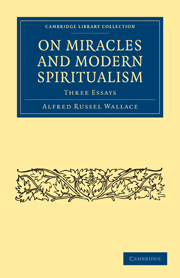Book contents
- Frontmatter
- Contents
- Dedication
- PREFACE
- I AN ANSWER TO THE ARGUMENTS OF HUME, LECKY, AND OTHERS AGAINST MIRACLES
- II THE SCIENTIFIC ASPECT OF THE SUPERNATURAL—
- 1 Introductory
- 2 Miracles and Modern Science
- 3 Modern Miracles viewed as Natural Phenomena
- 4 Od-Force, Animal Magnetism, and Clairvoyance
- 5 The Evidence of the Reality of, Apparitions
- 6 Modern Spiritualism: Evidence of Men of Science
- 7 Evidence of Literary and Professional Men to the Facts of Modern Spiritualism
- 8 The Theory of Spiritualism
- 9 The Moral Teachings of Spiritualism
- 10 Notes of Personal Evidence
- III A DEFENCE OF MODERN SPIRITUALISM
- APPENDIX
- INDEX
5 - The Evidence of the Reality of, Apparitions
Published online by Cambridge University Press: 29 August 2010
- Frontmatter
- Contents
- Dedication
- PREFACE
- I AN ANSWER TO THE ARGUMENTS OF HUME, LECKY, AND OTHERS AGAINST MIRACLES
- II THE SCIENTIFIC ASPECT OF THE SUPERNATURAL—
- 1 Introductory
- 2 Miracles and Modern Science
- 3 Modern Miracles viewed as Natural Phenomena
- 4 Od-Force, Animal Magnetism, and Clairvoyance
- 5 The Evidence of the Reality of, Apparitions
- 6 Modern Spiritualism: Evidence of Men of Science
- 7 Evidence of Literary and Professional Men to the Facts of Modern Spiritualism
- 8 The Theory of Spiritualism
- 9 The Moral Teachings of Spiritualism
- 10 Notes of Personal Evidence
- III A DEFENCE OF MODERN SPIRITUALISM
- APPENDIX
- INDEX
Summary
I now propose to give a few instances in which the evidence of the appearance of preter-human or spiritual beings is as good and definite as it is possible for any evidence of any fact to be. For this purpose I shall use some of the remarkable cases collected and investigated by the Hon. Robert Dale Owen, formerly member of Congress and American Minister at Naples. Mr. Owen is the author of works of a varied character; “Essays,” Moral Physiology,” “The Policy of Emancipation,” and many others. He has been, I believe, throughout his life a consistent and philosophical sceptic, and his writings show him to be well educated, logical, and extremely cautious in accepting evidence.
In 1855, during his official residence at Naples, his attention seems to have been first attracted to the subject of the “supernatural,” by witnessing the phenomena occurring in the presence of Mr. Home. He tells us that “sitting in his own well-lighted apartment, in company with three or four friends, all curious observers like himself,” a table and lamp weighing ninety-six pounds “rose eight or ten inches from the floor, and remained suspended in the air while one might count six or seven, the hands of all present being laid upon the table.”
And on another occasion he states:—“In the dining-room of a French nobleman, the Count d'Ourches, residing near Paris, I saw on the first day of October 1858, in broad daylight, at the close of a déjeuner à la fourchette, a dinner-table seating seven persons, with fruit and wine on it, rise and settle down as already described, while all the guests were standing around it, and not one of them touching it.
- Type
- Chapter
- Information
- On Miracles and Modern SpiritualismThree Essays, pp. 69 - 79Publisher: Cambridge University PressPrint publication year: 2009First published in: 1875

